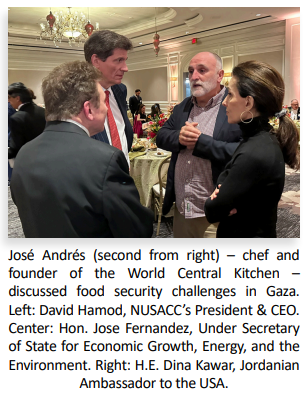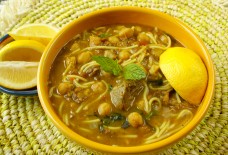National U.S.– Arab Chamber Hosts Thirteenth Annual Iftar Dinner at Ritz-Carlton in Washington, DC
Senior Leaders from Government, Business, and Civil Society Celebrate Ramadan While Also Acknowledging Suffering in Gaza
Imam Mohamed Magid: “We Must Stand Together as One Humanity”
On March 26, the National U.S. – Arab Chamber of Commerce (NUSACC) – America’s #1 business gateway to the Middle East and North Africa (MENA) – hosted its thirteenth annual Iftar dinner in honor of the Arab diplomatic community and the League of Arab States. Senior government officials and business leaders were in attendance, including upwards of a dozen Arab Chiefs of Mission representing the MENA region.
The NUSACC Iftar, held in partnership with the Washington DC Ritz-Carlton Hotel, has become a Washington tradition. The Embassy of the United Arab Emirates served as the Lead Sponsor of this year’s event, supported by nine Gold sponsors: Abaris Capital Advisors, LLC; American Council of Life Insurers; Alsulaiman Group; Assured Communications Advisors; Boeing; The Shafik Gabr Foundation; Islamic Services of America; Kuwait Finance House; Oman Chamber of Commerce & Industry.

The Honorable Jose Fernandez – Under Secretary of State for Economic Growth, Energy, and the Environment – has been an esteemed guest at NUSACC functions on multiple occasions. “I greatly appreciate the efforts of the National U.S. – Arab Chamber of Commerce (NUSACC) to serve as a bridge between the United States and the Arab world,” he noted. “NUSACC’s annual Iftar – which I have attended for several years – is just one example of the Chamber’s outreach. Best wishes to NUSACC on its 50th anniversary as it continues to foster commercial and cultural ties from the USA to the Middle East, North Africa, and beyond.”

Fernandez was joined at the head table by chef José Andrés, Founder and Chief Feeding Officer at World Central Kitchen (WCK). Where others have feared to tread, WCK team members have served meals and created kitchens for communities worldwide that are suffering from hurricanes, wildfires, tsunamis, volcano eruptions, and war . . . most recently in Ukraine, Haiti, and Gaza.
In March 2024, WCK delivered 200 tons of food and water to Gaza by ship. In recent days, a second convoy of ships was in the process of delivering an additional 400 tons of food and supplies to help stem starvation and disease in Gaza.
Tragically, seven WCK humanitarian workers were targeted on April 1 by the Israel Defense Forces (IDF). NUSACC extends its deepest condolences to WCK on the loss of these innocent lives. The IDF must be held accountable for this senseless tragedy, the latest of many in Gaza.
NUSACC Iftar dinners are always contemplative, but this year’s gathering was especially respectful, acknowledging the ongoing suffering in Gaza and elsewhere. “Ramadan is a time of celebration,” noted David Hamod, NUSACC’s President & CEO, “but it is also a time of reflection and remembrance.” He went on to say, “This has been a very challenging year in the Middle East and North Africa, with more than 50,000 people losing their lives to wars, failed migration, disease, starvation, and natural disasters.” Hamod concluded his opening remarks with a moment of silence dedicated to innocent victims across the MENA region.
The NUSACC Iftar in Context
Breaking the fast (Iftar) during Ramadan is a traditional event performed daily by an estimated two billion Muslims around the globe. Ramadan is a holy month of spiritual cleansing in which adherents of Islam rededicate themselves to God, worship, and read the Quran, Islam’s holiest book. The month-long period is marked by fasting, personal sacrifice, self-discipline, and increased generosity, especially toward the underprivileged.
David Hamod, NUSACC’s President & CEO, noted, “Ramadan encourages compassion, tolerance, empathy, forgiveness, and respect. Such attributes are part of Islam and of all the world’s great religions.” He concluded, “The NUSACC Iftar celebrates and welcomes people of different faiths, providing us with an opportunity to ‘break bread’ and share fellowship.”
The NUSACC Iftar, now in its thirteenth year, was the first of its kind. Today, it is widely regarded as the most elegant Iftar in America, in large part because of the event’s partnership with The Ritz-Carlton, the Luxury Brand Leader of Marriott International.
“We were honored to partner with NUSACC for the annual Iftar gathering. The Ritz-Carlton family prides itself on building strong relationships within our community, and this evening was evidence of that,” said Bradley Cance, General Manager of The Ritz-Carlton, Washington, DC. At the Iftar, Cance’s team was joined by General Managers from other Ritz properties in the greater Washington DC area, including Rishi Malhotra (Georgetown) and Olivier Lau (Tysons Corner).
In a drawing held at the end of the night, four fortunate dinner guests won complimentary stays at four Washington DC area Ritz-Carlton properties (including Pentagon City).
Honoring the Diplomats
NUSACC’s Iftar dinner provides an opportunity to gain a better understanding of Islamic customs and traditions. The event also highlights Arab embassies and consulates, as well as the League of Arab States, which officially recognizes NUSACC as a business gateway between the United States and the 22 countries of the Arab world.
At this year’s event, participants welcomed H.E. Ambassador Abdulkhalig
Bin Rafaa, Chief Representative of the Arab League in Washington DC. Bin Rafaa arrived in the nation’s capital in autumn 2023, so this was his first NUSACC Iftar.
“I was pleased to attend the NUSACC Iftar in honor of the League of Arab States and the Arab diplomatic community,” said Bin Rafaa. “The Arab League appreciates its long partnership with NUSACC, as both entities serve as bridges between the Arab world and the United States.” He concluded, “Congratulations to NUSACC on an exceptional evening of tolerance, respect, and fellowship.”
Imam Magid: We Must Stand Together as One Humanity
Imam Mohamed Magid, Executive Religious Director of the All Dulles Area Muslim Society (ADAMS) Center in Virginia, offered remarks after dinner.
“The month of Ramadan is full of reflection and contemplation on the Holy Quran,” Imam Magid noted. “This blessed book of God’s words calls us to care for human life and dignity wherever it may be, regardless of race, religion, gender, ethnic or cultural background, or social status. As God Almighty says in chapter 49:13, ‘O humanity! We created you from a male and a female and made you into peoples and tribes so that you may get to know one another’.”
He continued, “Many verses in the Holy Quran talk about dignity and honoring human life. In Chapter 5:32, God Almighty says that ‘whoever takes an innocent life, it will be as if they killed all of humanity; and whoever saves a life, it will be as if they saved all of humanity’.” The sanctity of life is a common theme amongst all original scriptures, Imam Magid pointed out, “as we believe that the right for everyone to live a dignified life was bestowed by God; that all humans are created equal.”
The Imam suggested that religious freedom plays a vital role in the economic prosperity of societies worldwide. “When individuals are free to practice their faith without fear of persecution,” he said, “it sets the stage for economic growth. Such growth has also blessed us all with an opportunity to use what we have to aid our fellow brothers and sisters in humanity who are the most vulnerable in today’s society.”
“I call upon all of us to contemplate every day the suffering of people who are being deprived of basic needs,” he noted, “such as the people of Gaza who unjustly lost their lives when they lined up for food and water.” He continued: “We must be able to stand together as one humanity against the taking of innocent life, and unite to provide the basic needs to live, regardless of religion. This is an obligation we have as people of faith; to live up to our values that allow every human being to live in freedom, prosperity, and have a right to access food, water, security, education, and to be able to worship freely.”
Imam Magid concluded, “As I stand before you today, the world is in pain. We watch today as thousands are killed, many are left not knowing where their next meal will come or if they’ll live to see the next day. Our responsibility as people of conscience and principle is to strive to allow every human to have the chance to reach their fullest potential.”
Arab Heritage in the USA
During the Iftar celebration, NUSACC’s David Hamod typically shares stories about the Arab – American experience. He does this, he says, because such anecdotes highlight human interactions between Americans and peoples of the Arab world, and they also serve to combat misconceptions about the MENA region.
This year, Hamod talked about the impact that Arab heritage and tradition have had on the United States. For example, consider this: In the top ten list of languages that have contributed the most words to the English language, Arabic is #6.
That’s somewhere between 2,338 words and 6,500 words – depending on whether they worked their way into the English language directly or indirectly, often via Spanish. Everything from Alcatraz, Algebra, and Almanac on one side of the alphabet, to Zenith on the other.
Hamod took Iftar guests back to the 1904 World’s Fair, hosted by St. Louis, Missouri. At that global event, largely through serendipity, two Syrian immigrants invented the ice cream cone, creating a new American tradition that became a sensation at the World’s Fair!
“I love this story,” Hamod said, “because it captures the American immigrant experience: Borrowing from the traditions of the Old World to create and customize something for the New World.” If it’s true that necessity is the mother of invention, Hamod noted, then “this story is all about innovation, timing, Lady Luck . . . and good taste, of course.”
Hamod talked about his travels along America’s “blue highways” to towns and cities named after the Arab world: Cairo (Illinois), Palestine (Ohio), Tripoli (Iowa), Tunis (Texas), Casablanca (New Mexico), and Memphis (Tennessee).
Many of these towns were little more than whistle-stops on railroad lines. Other communities, by contrast, were established by homesick Americans of Arab descent. These names helped them to create a connection between the old country, which they would never see again, and the United States, which offered the promise of a better life.
In many cases, Hamod said, one discovers Arab heritage in unlikely places. Like ancient Philadelphia – the “City of Brotherly Love” – is a site known today as Amman, Jordan. And the Carthage Stone, carved and crafted over a millennium ago in what is known today as Tunisia, occupies unique placement at the top of the Washington Monument.
Most extraordinary, perhaps, is the way that California acquired its name from the Arabic word Khalifa (“Caliph”).
To read the full text of Hamod’s speech, please click here.
Conclusion
“In support of the annual Iftar, the National U.S. – Arab Chamber of Commerce is proud to partner with the Ritz-Carlton and Arab embassies and consulates across the United States,” said the Honorable James Smith, NUSACC Board member and former U.S. Ambassador to Saudi Arabia. “We work closely with these diplomats day in and day out, enabling our Chamber to strengthen U.S. – Arab trade and investment.”
To see a three-minute video clip of the Iftar, please click here.
To read NUSACC’s report about the Iftar, please click here.
Visit Arab America’s blog here!









